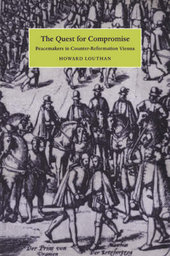
|
The Quest for Compromise: Peacemakers in Counter-Reformation Vienna
Paperback / softback
Main Details
| Title |
The Quest for Compromise: Peacemakers in Counter-Reformation Vienna
|
| Authors and Contributors |
By (author) Howard Louthan
|
| Series | Cambridge Studies in Early Modern History |
|---|
| Physical Properties |
| Format:Paperback / softback | | Pages:208 | | Dimensions(mm): Height 228,Width 152 |
|
| ISBN/Barcode |
9780521027120
|
| Classifications | Dewey:943.61303 |
|---|
| Audience | | Professional & Vocational | |
|---|
| Illustrations |
14 Halftones, unspecified
|
|
Publishing Details |
| Publisher |
Cambridge University Press
|
| Imprint |
Cambridge University Press
|
| Publication Date |
22 June 2006 |
| Publication Country |
United Kingdom
|
Description
The Quest for Compromise is an interdisciplinary study of the imperial court in late sixteenth-century Vienna, and a detailed examination of a fascinating moment of religious moderation. Against a backdrop of rising religious and confessional dogmatism, the Emperor Maximilian II (1564-1576) assembled a remarkable cast of courtiers who resisted extremes of both Reformation and Counter-Reformation. This book investigates the rise and fall of an irenic movement through four individuals whose work at the imperial court reflected the ideals of religious compromise and moderation. An Italian artist (Jacopo Strada), a Silesian physician (Johannes Crato), a Dutch librarian (Hugo Blotius) and a German soldier (Lazarus von Schwendi) sought peace and accommodation through a wide range of cultural, intellectual and political activity.
Reviews"Louthan's concise treatment is not restrictive: he examines complicated issues with finely balanced judgment that precludes sermonizing while suggesting that wisdom must prefer honorable compromise to bloody polarization. Excellent control of both primary and secondary sources and details of late-16th-century Central European humanism inform this useful study...Highly recommended." -- Choice "...the book will appeal to scholars of the Holy Roman Empire in the later sixteenth century and of religious tolerance in early modern Europe." Brad S. Gregory, Religious Studies Review "Louthan's study is a valuable contribution to the subject of confessional politics in the second half of the sixteenth century. He provides an eminently readable account and supplies the historical background information necessary to make the subject accessible even to the general reader. ...the book adds colour and detail to the general picture of the time, illustrating in particular the extent and the limitations of influence wielded by individual courtiers in Vienna." Erika Rummel, Canadian Jrnl of History "As Professor Louthan has ably demonstrated in this elegantly crafted book, history has a way of playing strange tricks on people." H-Net Reviews, Louis J. Reith, Georgetown University "This is a thought-provoking and extremely learned book. It helps make the case that there was an alternative to the confessional war that erupted in 1618. Well-chosen illustrations enhance the book." Robert Bireley, S.J., The Catholic Historical Review "...Howard Louthan's book introduces a distinctive perspective on sixteenth-century religious conflict. Anyone seeking to understand the Holy Roman Empire will want to consult [Louthan's] deft use of a rich array of materials." W. David Myers, Church History "Louthan's work on this project is impressive indeed. This book is definitely a major contribution to our understanding of the brief reign of Maximilian II and to the international scene within which confessional conflicts and attempts at their reconiciliation played out." John P. Spielman, American Historical Review
|